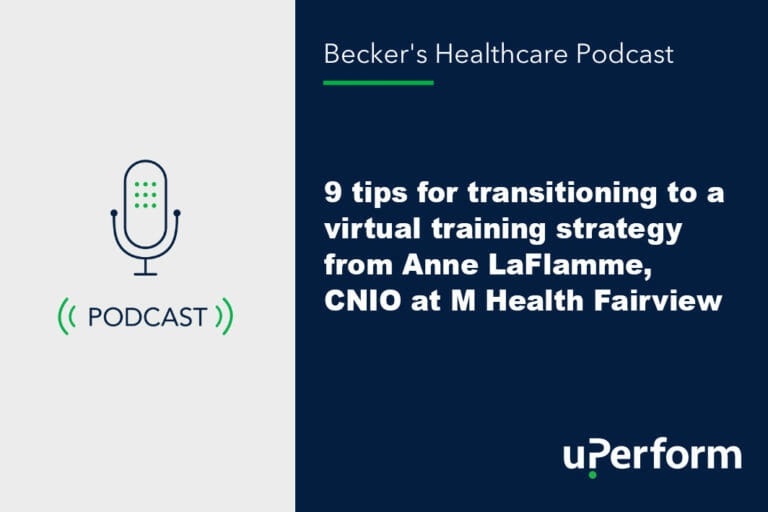Data shows that quality Epic training is critical for driving user satisfaction, proficiency and return on investment for the leading EHR. However, not all Epic training is equal, and how that training is delivered can lead to vastly different outcomes.
Our guide provides an overview of the different types of Epic training, where users can get trained for various Epic roles and best practices for organizations looking to improve their training models.
Why is Epic training so important?
Epic Systems is the leading EHR with a US market share hovering around 37%. That market share has been slowly, but steadily, creeping up in recent years, as other EHRs struggle to compete. Currently, one third of all US hospitals rely on Epic for essential healthcare operations.
The proper use of Epic helps ensure a positive experience for clinicians and patients, including:
Patient Safety and Care Quality: Epic drives many aspects of patient care. Clinicians leverage Epic to access patient information, track medical histories, manage treatment plans and more. A thorough understanding of Epic ensures caregivers can deliver quality care to patients.
Productivity and Proficiency: Quality training is the most effective way to drive clinician productivity and proficiency with Epic. This helps streamline workflows, enhance overall productivity and helps clinicians spend less time in the EHR.
Clinician Satisfaction: Healthcare burnout is severely impacting healthcare, and too much time in the EHR is partly to blame. KLAS Research data suggests that quality initial training is the single most important determinant in EHR satisfaction.
Regulatory Compliance: Healthcare organizations must adhere to strict regulatory standards and guidelines. Epic training includes education on compliance requirements, ensuring staff properly maintains things like patient data and security.
Epic Upgrades and Go-Lives: Ongoing Epic training is arguably just as important as initial onboarding. Epic regularly releases upgrades and updates to existing workflows, in addition to releasing new features and applications. Regular ongoing training helps drive adoption of new workflows.
Epic Excellence: Epic is continuously placing more emphasis on Epic training. Based on findings from KLAS Research, Epic has begun recommending that systems provide 2-5 hours of ongoing Epic training per year. It has also built out recognition programs to promote better use of Epic:
- Epic Good Install Program emphasizes the importance of training and offers a set of best practices and criteria to help organizations through initial implementation and go-live. The program also offers financial incentives for meeting specific criteria.
- Epic Gold Stars is a 10-level initiative designed to promote continuous improvement in EHR usability and feature adoption. Traditionally, the program has assessed a system’s implementation of various Epic tools and modules. Recently, Epic added additional criteria to evaluate a system’s adoption of these tools and modules. While there is no explicit training requirement for the program, health systems are finding that quality workflow-specific training is the most effective strategy for driving adoption.
- Epic Honor Roll offers financial incentives to organizations for effective use and optimization of Epic. The program focuses on eight core components, including key areas like ‘ease of use for providers’ and ‘ease of use for nurses.’
Create and deliver a better Epic learning experience with uPerform
uPerform is a just-in-time learning and support platform that enables health systems to create and deliver Epic training content to users directly in their workflow, decreasing time spent in training and increasing user satisfaction and efficiency. Schedule a demo to learn more about how uPerform can improve Epic training for your organization.
*Please Note: uPerform does not offer individual training for end users. We offer a learning and support platform subscription service for organizations looking to create and distribute training content to their user bases.
The Epic learning journey
Most end users will receive Epic training multiple times throughout their career. With its frequent update cycle, users need to keep up with workflow changes, new features and best practices. Here are some reasons a user might need Epic training.
Epic onboarding
New hires at Epic systems will almost always receive some form of Epic onboarding. Even those with extensive Epic experience should complete onboarding at a new organization. This is because each organization has a unique instance of Epic. This might mean completely different workflows, processes or policies for use.
Similarly, when an organization implements Epic for the first time, or implements new Epic modules, it should offer onboarding.
Ongoing training
Often overlooked, ongoing training is imperative to a successful Epic implementation. KLAS Research recommends providing clinicians with 3-5 hours of ongoing EHR training each year. Based on this recommendation, Epic has added this as a requirement for Epic Honor Roll recognition.
Driving engagement with ongoing training is a challenge for many organizations. Delivering in-app training in the workflow can be a great way to drive engagement and support users while they work.
Upgrades and new go-lives
Epic regularly releases new upgrades. Organizations often stick to a regular upgrade schedule, which may be quarterly or semi-annually. These upgrades may include workflow changes, which often require some form of Epic training. Furthermore, organizations may introduce Epic go-lives for new Epic modules, which also requires additional training.
Troubleshooting and support
As with any software application, users sometimes run into roadblocks while using Epic. They may forget how to complete a specific workflow or run into a troubleshooting error. Access to troubleshooting resources helps clinicians get back to focusing on patient care.
Epic learning formats
There are many ways to deliver Epic training. Traditionally, healthcare organizations have offered instructor-led classroom training. However, as scalability, cost and time become greater concerns, many organizations are ditching the classroom in favor of other learning formats. Many of these learning formats are proving to be more effective.
Instructor-led training
Instructors may deliver in-person or virtual training. Both tend to be expensive and difficult to scale. Furthermore, it is often less effective for a few reasons.
The first is poor learner retention. The Ebbinghaus Forgetting Curve suggests that learners forget over 55% of what they learn in the first hour, and 75% within six days. Instructor-led training offers little engagement and frontloads information in just one, or a few, training sessions.
Secondly, instructor-led training doesn’t effectively cater to individual learning needs or experience with Epic. Instructors often train multiple roles at once, which means course materials aren’t relevant or specific to the learner’s workflow. Furthermore, learners have different levels of experience with Epic and learn at different rates.
Dr. CT Lin, CMIO, shares the difficulties UCHealth faced when delivering instructor-led training. These challenges occurred both in person and virtually.
At-the-elbow training
At-the-elbow training involves providing on-site, personalized training and support to users while they work. Typically, a trainer, support staff or super user supports new Epic users as they navigate the system.
While effective, this form of training is not scalable. At-the-elbow training is a great addition to other forms of Epic training. However, organizations should not rely on only delivering at-the-elbow training.
Epic training courses
Epic training courses, often in the form of eLearning, are another common training format. Learning and development teams often leverage a Learning Management System (LMS) to deliver Epic training courses. They are an easy way to deliver self-directed learning. Self-directed learning is gaining more popularity for its effectiveness in saving time in both training and the EHR.
Asynchronous training
Lastly, asynchronous training, also referred to as self-paced or self-directed training, has been gaining traction as a highly scalable and effective eLearning model. Asynchronous training enables training teams to create content for various departments, roles and workflows and deliver it to users at scale. End users navigate through predefined learning pathways at their own pace. A recent KLAS study found that clinicians save an average of 90 minutes per week in the EHR for every hour they spend engaged in self-directed eLearning.
Where to find Epic software training for your role
If you’re looking for Epic training, it’s best to ask what’s available through your organization. Most health systems that use Epic provide some form of Epic training for any staff who will be using the system. Any training offered directly through Epic will require sponsorship through your organization.
Epic training for physicians
Physicians usually receive some form of Epic training through their organization as part of new hire onboarding. This initial onboarding is important even for experienced Epic users, because each system’s Epic instance is unique.
If you’re unfamiliar with Epic, don’t worry about this affecting your candidacy for positions. Health systems will hire you based on your clinical knowledge, not your experience with a specific EHR. They will provide the necessary training to help you succeed in Epic.
Epic training for nurses
Similarly, health systems are prepared to deliver Epic training for nurses. Again, if you’re looking to apply to a new nursing position, don’t feel like Epic knowledge is a requirement. Your organization will provide the necessary training.
Epic training for IT professionals
Epic offers certifications for IT professionals. To enroll in certification training through Epic University, you will need a sponsorship from your organization.
Additional training resources on the Epic UserWeb
You may be looking for additional training beyond what your organization provides. Your Epic login provides you with access to additional resources. To access the Epic UserWeb, you will need to create an account using an email address from an Epic health system.
Become an Epic analyst or trainer with self-study proficiencies
If you’re looking to become an Epic analyst or trainer, Epic UserWeb offers self-study proficiency certification courses. Certifications focus on different Epic modules (Stork, Radiant, Beaker, etc.). Your self-study course will be free, but the certification exam will include a small fee.
Epic WeLearnings
Epic WeLearnings are best suited for training leads and educators. WeLearnings is a knowledge sharing community that includes both Epic-created content, as well as client-created content. It provides educators with starter courses for end users that they can customize to meet their unique Epic instance.
It’s Possible, Nova Notes and What’s New content
Epic also offers additional content for end users looking to build on their knowledge of everyday workflows. What’s New and It’s Possible provides opportunities for modular learning on specific workflows or tasks. Nova Notes include information and basic training materials on new Epic upgrades. However, the value of these trainings can be limited, because they aren’t workflow-specific.
How uPerform helps organizations deliver scalable and effective Epic training
With healthcare budgets facing more scrutiny, some organizations are putting training and development on the backburner. And with more mergers and acquisitions, user bases are growing while training teams often remain the same size. This means Epic trainers and educators must find ways to do more with less.
uPerform’s just-in-time training platform can help organizations build a sustainable Epic training program that drives clinician satisfaction and proficiency. Health systems leveraging uPerform to deliver just-in-time training report:
Better scalability: As organizations grow, it can be difficult to keep up with increased training demands. uPerform centralizes all your learning content and allows you to scale self-directed learning opportunities to all your Epic users. For instance, Baylor Scott & White Health used uPerform to deliver training to a geographically dispersed user base, saving the organization 186,000 hours of travel and onboarding time.
Faster onboarding: Delivering a self-directed onboarding experience allows organizations to onboarding new hires faster. Gundersen Health has reduced the time it takes to onboard some roles by as much as 75%
Improved Satisfaction: With workflow-specific training available at their time of need, users of uPerform report higher satisfaction with training and Epic than non-users. At M Health Fairview, uPerform users rated their Net EHR Experience Score 19 points higher than non-uPerform users.
Reduced training costs: In-person training is time-consuming and cost prohibitive. uPerform enables organizations to quickly create learning content andd eliver it to their entire Epic user base. Without the need for in-person classroom training, organizations save on physical space and travel costs. In 2024, UCHealth credited $3 million in savings to its asynchronous training program.
Related Articles
Create and deliver Epic training with uPerform
uPerform’s just-in-time training and support platform enables training teams to quickly create training materials and deliver them to users based on their role and workflow. Schedule a demo today and learn how uPerform can help you scale your training, improve clinician satisfaction with Epic and drive user proficiency.










